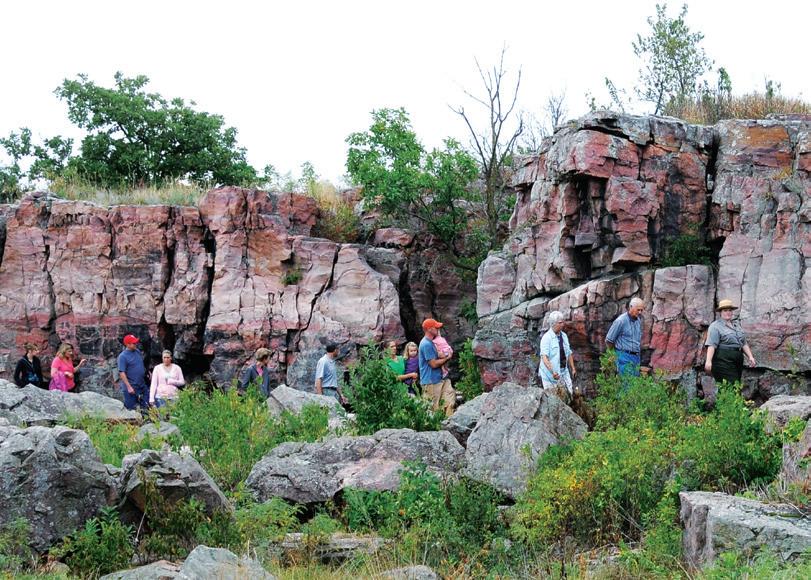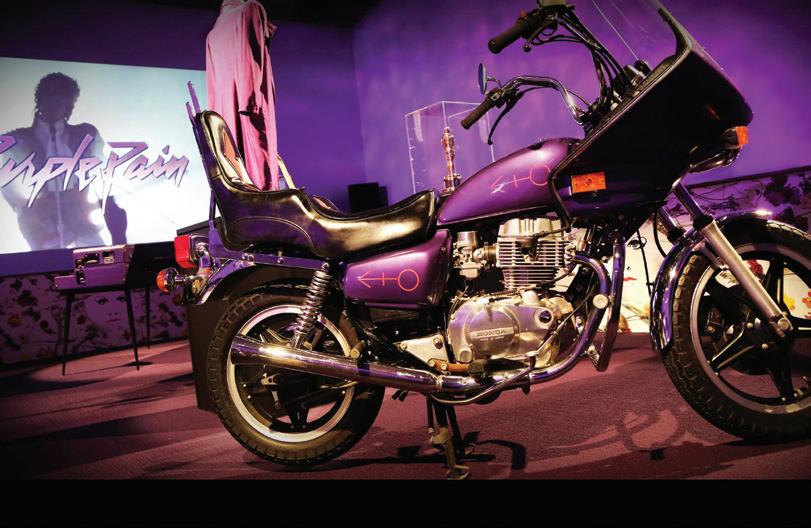
6 minute read
MINNESOTA WELCOMES GROUPS
From shopping forays to wildlife watching, the state offers countless options for tour planners
By Randy Mink
Whether your travelers seek out urban pleasures or access to nature, Minnesota abounds with crowd-pleasing possibilities. From the Twin Cities to the Northwoods, the nation’s 12th largest state is filled with things to see and do, and there’s water, water everywhere.
The state capital, St. Paul, and neighboring Minneapolis make up the Twin Cities, the commercial and cultural hub of Minnesota. Among the communities comprising the country’s 16th largest metro area is Bloomington, where the 500-plus stores at Mall of America (MOA) lure shoppers from all over the world. Besides retail revelry, the iconic megamall offers SEA LIFE aquarium and thrill rides at Nickelodeon Universe indoor theme park. Recent additions at MOA include ClimbZone, a 40wall climbing park at Nickelodeon Universe; an M&M’s destination store; a B&B Theatres multiplex and The Fair on 4, which features gokart racing and axe-throwing.
Spectator Sports And Theater Fare
The Twin Cities are home to professional men’s and women’s teams in every major sport, offering year-round sports entertainment. The state also has a thriving performing arts scene.
Minneapolis’ nationally acclaimed Guthrie Theater, situated on the banks of the Mississippi, presents classic and contemporary plays. The city’s Hennepin Theatre Trust brings in Broadway blockbusters, plus musicians, comedians and holiday shows, to its elegantly restored State, Orpheum and Pantages theaters. St. Paul’s Ordway Center for the Performing Arts hosts the St. Paul Chamber Orchestra, Minnesota Opera, dance ensembles, concerts and touring Broadway shows. In Chanhassen, 20 minutes west of downtown Minneapolis, Chanhassen Dinner Theatres, with three theaters under one roof, is the nation’s largest dinner theater, offering Broadway musicals, comedies, cabarets and concerts.
Professional theater can be found in other parts of the state as well. In the little town of Lanesboro in southeastern Minnesota’s Bluff Country, Commonweal Theatre is gearing up for its 35th season. Up north, downtown Bemidji’s Historic Chief Theater is a former movie house turned performing arts center. Its resident production company, the Paul Bunyan Playhouse, is the oldest professional summer stock company in Minnesota and draws actors from across the country. Past productions have included Mamma Mia!, Little Shop of Horrors, Grease and Young Frankenstein.
Melting Pot Of Cultures
Minnesota is known for its Nordic influences, thanks to early settlers from the Old World. In fact, it claims the largest population of Swedes and Norwegians outside of Scandinavia. More recent immigrants have added their own contributions to the state’s ethnic make-up.
In Minneapolis, the American Swedish Institute occupies the 33-room Turnblad Mansion and attached Nelson Cultural Center. On display are collections of Swedish glass, textiles and decorative and fine arts, along with immigrant artifacts and contemporary exhibits from Sweden and the Nordic region. Tastes of Stockholm in the center’s Fika Cafe include Swedish meatballs, gravlax and cardamom buns.
Swedish heritage also is preserved at Gammelgarden Museum in Scandia. The 11-acre site exhibits a Lutheran church, log house and other buildings constructed by Swedish immigrants in the 1850s. In Moorhead, Hjemkomst Interpretive Center showcases a fully rigged Viking ship replica that sailed from Duluth to Norway in 1982 and plays a 20-minute documentary on the oak vessel’s construction and epic trans-Atlantic voyage.
Over the past 30 years, newer immigrant and refugee groups — like the Hmong, Somali, Ethiopian and Mexican populations — have brought their food, music, art and handiwork into the Twin Cities’ cultural mix. One of the best places to sample the diversity is Midtown Global Market in Minneapolis, which offers ethnic dishes, groceries and gifts representing 22 cultures, from Vietnamese and Venezuelan to Mexican and Moroccan.

Native American heritage sites can be found in all parts of Minnesota, which is home to 11 sovereign Indigenous nations. Mille Lacs Indian Museum & Trading Post is a popular attraction in the central region. Jeffers Petroglyphs in southwestern Minnesota features a rocky outcrop with over 4,000 images carved by Indigenous societies as long ago as 7000 B.C. Nearby, Pipestone National Monument preserves the sacred site where generations of American Indians have quarried the soft red pipestone that is carved into pipes used for prayer. Along the shore of Lake Superior, the reconstructed stockade at Grand Portage National Monument chronicles relations between the fur traders and Ojibwe people. Summertime powwows in various Minnesota locations invite the public to witness traditional music, dance and storytelling.

FAMOUS PEOPLE, FAMOUS PRODUCTS
Minnesota has produced celebrated persons known the world over, and countless products manufactured in the state are household names.
Visitors can connect with famous Minnesotans at attractions like Paisley Park , the private estate of the late music icon Prince. The superstar’s Chanhassen home, recording studio and performance venue, now a museum complex, bursts with artifacts and memorabilia, including concert wardrobes, musical instruments, motorcycles and a space chronicling Prince films such as Purple Rain .

Follow the Yellow Brick Road to northern Minnesota and the Grand Rapids birthplace of a true Hollywood legend, the singer/actress most people remember as Kansas teenager Dorothy Gale in the 1939 film classic The Wizard of Oz . The Judy Garland Museum incorporates the house where the future star grew up in the 1920s before her family moved to California.
The Sinclair Lewis Boyhood Home in Sauk Centre pays homage to America’s first Nobel Prize winner for literature. Observations about small-town life in Main Street (1920) and other Lewis novels were drawn from his hometown. Another author is remembered at the Laura Ingalls Wilder Museum in Walnut Grove. Known for her Little House on the Prairie series about pioneer life, Ingalls Wilder lived in Walnut Grove as a girl in the 1870s.
At the Charles A. Lindbergh Historic Site in Little Falls, groups can tour the famed aviator’s boyhood home and a museum that includes a replica of the Spirit of Louis cockpit and the tale of his son’s kidnapping.
Cartoonist Charles Schulz, creator of the “ Peanuts ” comic strip, spent much of his life in St. Paul, where his memory is enshrined in bronze statues of Charlie Brown, Lucy, Linus, Snoopy and other characters in Rice Park and other locations. They make good photo ops, as do the larger-than-life painted statues of the mythical lumberjack Paul Bunyan and Babe the Blue Ox at the visitor center in Bemidji.
Group tours at the SPAM Museum in Austin spotlight the history of the canned meat product and include samples on pretzel-rod skewers. The gift shop has hundreds of SPAMrelated souvenirs and stocks varieties of SPAM not commonly found on supermarket shelves.
The Red Wing Shoe Museum in Red Wing sheds light on another Minnesota- made product through videos, vintage photos and historical artifacts. Outside the museum, everyone takes selfies with the World’s Largest Boot (size 638½ D), which stands six feet tall.
Communing With Nature
For outdoors-minded groups looking for elbow room and recreational opportunities, Minnesota offers an abundance of national, state and regional parks. Zoos, wildlife centers, gardens and arboretums provide additional fresh-air options. In the southeastern corner of

At the National Eagle Center in Wabasha visitors see live bald and golden eagles on display, learn about them from naturalist-educators and view (especially in winter) the great raptors perched in trees along the river. Wildlife enthusiasts also flock to the International Wolf Center and North American Bear Center , both in Ely, to see the four-legged residents. Minneopa and Blue Mounds state parks , in the southwest, have bison herds.
In the Twin Cities area, animal fans get their kicks at the Minnesota Zoo in Apple Valley and St. Paul’s Como Park Zoo . The Great Lakes Aquarium in Duluth explores marine life associated with Lake Superior.
Minnesota, groups marvel at the 60-foot-tall waterfall and massive stalactites at Niagara Cave in Harmony. Not far away, Forestville/ Mystery Cave State Park encompasses Minnesota’s longest cave and Historic Forestville, a restored 1800s village.

At Itasca State Park, Minnesota’s oldest and second-largest state park, an obligatory stop is the Mississippi Headwaters, the point where a humble stream flows out of Lake Itasca on its 2,552-mile journey to the Gulf of Mexico. On naturalist-guided lake cruises aboard the Chester Charles II excursion boat, groups may see eagles, herons, cormorants and the common loon, the state bird.
For those who prefer flora over fauna, the state has lots of horticultural exclamation points. The Minnesota Landscape Arboretum in Chaska, part of the University of Minnesota, includes woodlands, ponds, prairie and 12 acres of manicured gardens. It is the largest public garden in the Upper Midwest. The indoor and outdoor gardens of Marjorie McNeeley Conservatory, next to St. Paul’s Como Park Zoo, are filled with exotic plants and floral displays. At Munsinger and Clemens Gardens in St. Cloud, visitors can stroll beneath the pines along the Mississippi River and through formal flower and rose beds. Leif Erikson Park & Rose Garden commands a pretty setting along the shore of Lake Superior; its more than 3,000 rose bushes represent 100 varieties.








